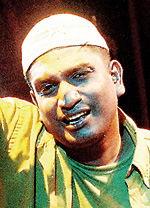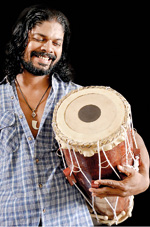Exploring social dynamics

Malith Pieris
The next time you go for a walk, be wary for you may find a group of people keenly observing you from afar. That’s how Jayampathi Guruge and his team prepared for Walking Path, a silent play about the curious social dynamics that exist amongst the groomed bushes and paved paths of Colombo’s finest walkways. “It’s fascinating,” muses the director. “Are we really walking for fitness anymore?”

Jayanath Gunasekera
Jayampathi’s play is one of the two that will be performed July 23 to 27 at the Lionel Wendt by the Stages Theatre Group, a collective of artists keen on pushing the boundaries of Lankan theatre with original works, collaborations, translations and workshops. The other, Daasa Mallige Bangalawa directed by Ruwan Malith Pieris and Kalana Jayanath Gunasekera, will return to the stage after a hiatus of 10 years.
Walking Path is very modern; a piece of devised theatre that Jayampathi-a student of the University of Visual and Performing Arts-and well known director Ruwanthie de Chickera conceptualised to depict human relationships without the use of words. “I find it increasingly challenging and unpredictable to be involved in this form of theatre,” says Ruwanthie on the undefined roles of both cast and crew in such a production. “Every step is quite volatile and you learn many things along the way.” In using the setting of a walking path to bring to life complex human relationships and realities, they hope to afford the audience an experience that is both familiar and thought provoking.

Dharmapriya Dias
For Jayampathi and many others, the ‘mushrooming’ of walking paths began with the end of the war in 2009. “There’s a certain sense of freedom that I think we instantly associate with these places,” he points out. But he wonders if this freedom is a sustainable, real thing. “We’re increasingly alienated from each other, aren’t we?”
For this play, Jayampathi-and later his cast-spent a fair amount of time lingering in Colombo’s many walking paths, observing those that they would later attempt to bring to life on stage. “There are two types of people in these places usually,” we’re told. “The ones who walk, and the people who sit and watch.” Then there’s the cast and crew who watch everyone and are probably watched in return, he laughs.
The play, completely sans dialogue, will explore the interaction and relationships on these walking paths. For Jayampathi this will also be a social experiment of sorts; “are we capable of sitting still for a long period of time as an audience, watching a play that has no words?”
 Walking Path is on at the Lionel Wendt on July 26 and 27 from 7 p.m. The play stars Bimsara Premaratne, Ruvin de Silva, Poojana Dandeniya, Krishantha Jayabahu, Thivanka Ranasinghe, Jeena Lakmali Geeth, Shanaka Fernando and Govinda Palagolla.
Walking Path is on at the Lionel Wendt on July 26 and 27 from 7 p.m. The play stars Bimsara Premaratne, Ruvin de Silva, Poojana Dandeniya, Krishantha Jayabahu, Thivanka Ranasinghe, Jeena Lakmali Geeth, Shanaka Fernando and Govinda Palagolla.
Bringing back a rather controversial play from 2004 is Ruwan Malith Pieris and Kalana Jayanath Gunasekera, who return to the stage as directors of ‘Daasa Mallige Bangalawa’, an adaptation of Indian playwright Vijay Tendulkar’s Sakharam Binder (1972). The script has been adapted for the local stage with some minor changes-most prominently Daasa’s character, a book binder in the original, will become a fisherman in this version.

Jayantha Muthuthanthri Pix by Susantha Liyanawatte
The story is a strangely familiar (albeit confounding) one for Asian audiences. Daasa brings home women in succession; they cook, clean and keep house for him and in return they are looked after. “He either gets tired of them, or they get tired of him,” explains the director. Six of these women come and go until the seventh-a slight, kindly and god fearing woman-attempts to slowly make her presence felt.
“Daasa is a conventional man,” says Malith. “He believes in the traditional role played by both man and woman. His women are expected to cater to his needs, and in return he looks after them.” When it was originally staged in 2004 Daasa Mallige Bangalawa drew both positive and negative reviews, but Malith believes that the negativity stemmed largely due to its controversial themes and content. “The general audience responded well,” he says. The play won several awards at the 2004 State Drama Festival, including gongs for Best Director, Best Actress (Nilmini Buvaneka), Best Supporting Actress (Ravini Anuradha Perera), Best Supporting Actor, Best Script Adaptation (S. Karunaratne), Best Make up (Sumedha Hewawitharana), Best Set Design (Dharmapriya Dias) and Music – Jury Award.
This time’s cast will include Jayantha Muthuthanthri, Dharmapriya Dias, Nimini Buvaneka, Hemantha Eriyagama and Ravini Anuradha Perera.
The play will be staged on July 23 and 24 from 7 p.m.at the Wendt.



